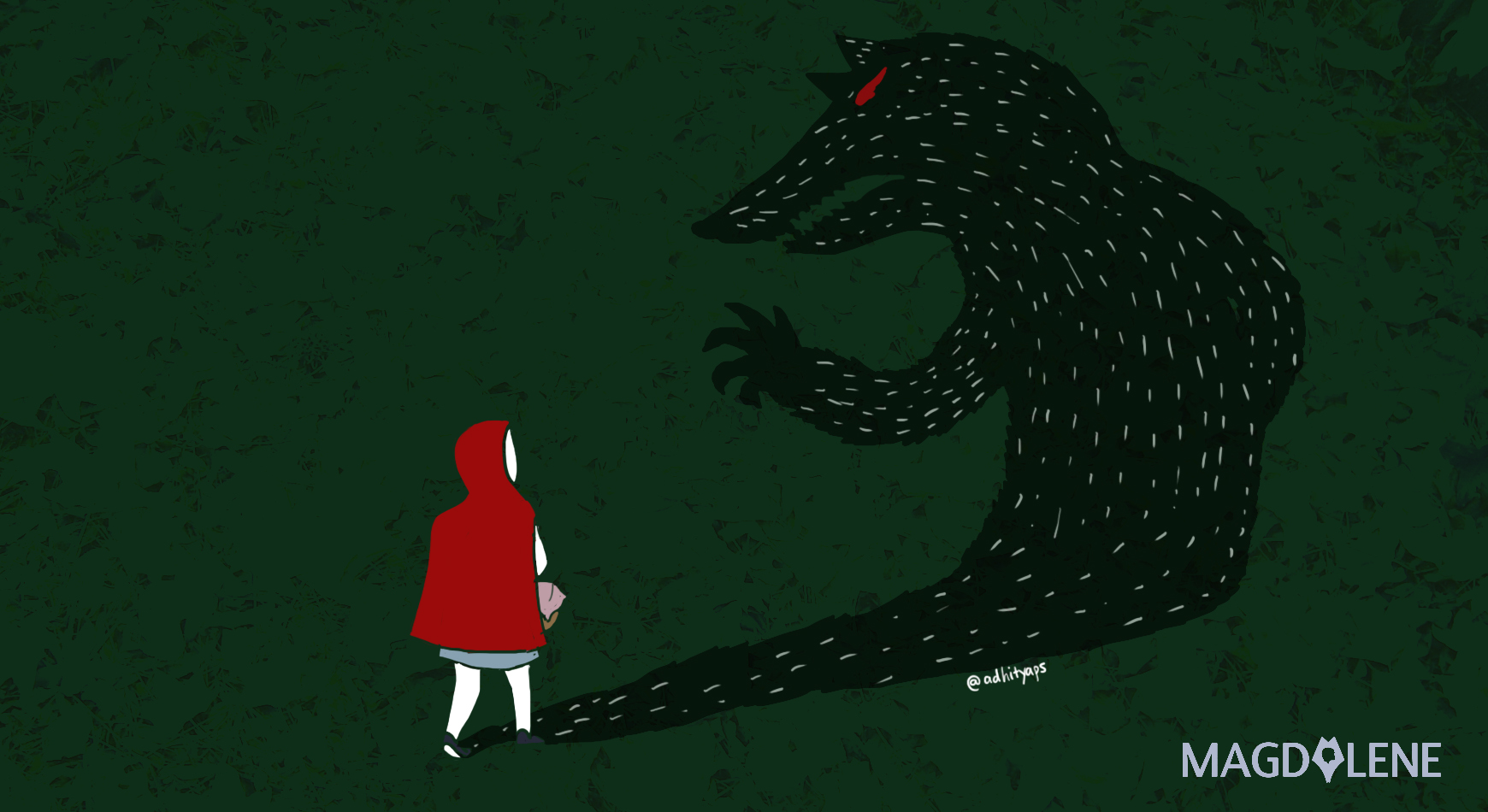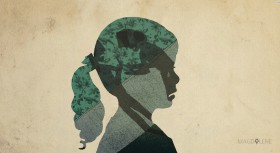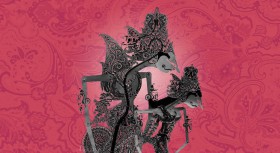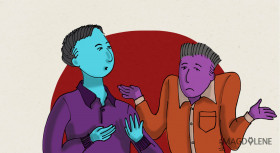Once upon a time, there was a little girl who lived in a village near the forest. Whenever she went out, the little girl wore a red riding cloak, so everyone in the village called her Little Red Riding Hood.
One morning, Little Red Riding Hood asked her mother if she could go to visit her grandmother as it had been awhile since they'd seen each other.
"That's a good idea," her mother said. So they packed a nice basket for Little Red Riding Hood to take to her grandmother.
When the basket was ready, the little girl put on her red cloak and kissed her mother goodbye.
"Remember, go straight to Grandma's house," her mother cautioned. "Don't dawdle along the way and please don't talk to strangers! The woods are dangerous."
"Don't worry, mommy," said Little Red Riding Hood, "I'll be careful."
But when Little Red Riding Hood noticed some lovely flowers in the woods, she forgot her promise to her mother. She picked a few, watched the butterflies flit about for a while, listened to the frogs croaking and then picked a few more.
Little Red Riding Hood was enjoying the warm summer day so much, that she didn't notice a dark shadow approaching out of the forest behind her...
If this classic bedtime story really happened in our time, we would be blaming Little Red Riding Hood for not obeying her mother, wandering alone in the forest and talking to a stranger.
Forget about the Big Bad Wolf, who had eaten the girl’s grandmother and was planning to do the same to her. The same happens in the real world when it comes to our society’s perception of gender-based violence.
There’s a significant difference between what we tell boys and what we tell girls once they hit puberty. I noticed this when I observed how parents encouraged their sons to be circumcised (where I live, male and female circumcision are still a common practice, both for religious and cultural reasons).
Once a boy or a girl reaches certain age, they get circumcised as a symbol that they have reached puberty. A circumcised boy would then be seen and treated as a “man” and thus entitled to certain male privileges. Boys take pride in their circumcision, as it is perceived as a point that turns boys into men.
On the other hand, a circumcised girl is required to guard themselves and encouraged to preserve their purity and not let any man touch her. After puberty, a man is expected to start having sexual interest or activity or relationship, while a woman is expected to be prudish and keep their innocence. It is common to have people judge a man and a woman based on his and her sexual activity, but for completely opposite reasons.
Since a very young age, a boy has been taught to be proud of his penis, while a girl is taught to keep her vagina at a distance. A boy is always told that a circumcision modifies his penis so that he will be an adult, while a girl is told that her vagina is off limits and that it belongs to her future husband. Although her vagina is a part of her body, she has no right to it.
It is no surprise then that this contrast in “sex education” results in a society that tends to blame women for not being able to protect themselves or to avoid sexual problems with men, instead of one that expects men to behave properly.
We tend to admire a man for the number of women he has conquered, but we praise a woman for how few relationships she has had. This is why the rudest swear words for men are always related to the (small) size of his penis and/or the (low) quality of his sexual performance, while the rudest swear words for women are related to the high frequency of her sexual activity.
Women’s purity, innocence or virginity has always been a commodity. Since the dawn of the patriarchy system, virgins were always valued higher than non-virgins; be it for brides, war prizes or sex slaves. The obligation to keep one’s innocence is seen as a privilege, as an honor, a holy duty for a woman. Women are told that preserving their virginity is a proof of love for their future husband and an indication of self-control. A virgin is a proud woman.
Having been indoctrinated with these views since we were young, we’ve grown up to look down on women who lost their virginity before marriage. And because we are taught that virginity is a husband’s right, but a woman’s responsibility, we end up always blaming the woman, no matter what the story is.
This is why so many sexual crimes go unreported, even when the victim is male. We are already used to victim blaming and slut-shaming, we forget that a victim is a victim, and a crime is a crime. We are never taught how to control our sexual urges, so we never expect the rapists or the sexual offenders to be able to stop doing their crimes. We over-glorify men and their penises, we don’t put the responsibilities of not committing sexual violence on men and we justify their actions by blaming the victims.
It is interesting, however, to note that the ideal role model for men in ancient Greek were those who have small penises, as large penis size are associated with foolishness and the inability to control oneself. People used to worship women more than men because of the ability of women to conceive and give birth to a new life, but when new religions emerged along with their patriarchal views, attitudes on men and women shifted.
We live in an era in which both men and women see it normal for women to be blamed for whatever happens to them. The trend may change with the rise of feminism in several countries, but in order to reach gender equality, we have to stop judging people based on their gender.
In a developing country like Indonesia, misogyny is deeply rooted in society, and feminism is still badly needed to counter it. As long as we still see women’s actions or clothes or manners as risk factors and focus on reducing the risk factors, instead of treating the main cause (the act of crime), we would only be treating sexual crimes symptomatically, not causatively.
Blocking porn sites, censoring the media, denying sex education for children, practicing virginity test, performing chemical castration for rapists and sexual offenders – these are only short-term solutions. If we want to do it right, we have to change our views and perspective about men and women and start treating both genders equally.
Sari Tjiang is a keen reader and aspires to be a good writer. She considers herself to be a mature in mind and a child at heart. The girl has strong faith in science and humanity, and you can check her personal thoughts on her personal blog http://saritjiang.wordpress.com.
To continue the conversation and support the campaign against sexual violence, visit campaign.com/mulaibicara.








Comments